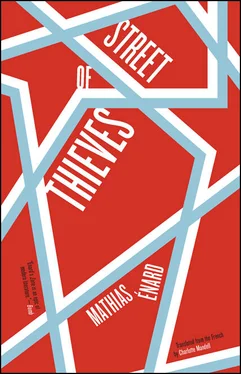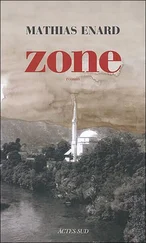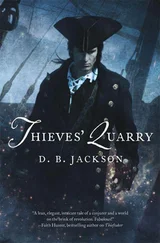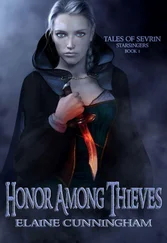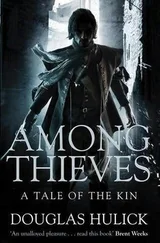The one-on-one class went well, even though Judit was a little absent. We had read a passage by Ibn Battuta that seemed to suit current events. Ibn Battuta is in India, with the Sultan Muhammed Shah, and he relates how a Sheikh named Shihab-ud-dun, very powerful and well-respected, refused to appear before the Sultan when he had been summoned; the Sheikh explains to the court messenger that “he would never serve a tyrant.” So the Sultan sent for him to be taken by force:
“You say I’m a tyrant?”
“Yes,” replied the Sheikh, “you are a tyrant, and among your tyrannies, there is this and that,” and he began to enumerate on a number of them, like the destruction of the city of Delhi and the expulsion of its inhabitants.
The Sultan held his sword out to his vizier, saying:
“If I am a tyrant, cut off my head!”
“The man who calls you a tyrant is a dead man, but you yourself know perfectly well that you are one,” interrupted the Sheikh.
The Sultan had him arrested and locked up for fourteen days with nothing to eat or drink; every day he was brought to the courtroom, where the judges asked him to withdraw what he had said.
“I will not retract my words. I am made of the same cloth as the martyrs.”
On the fourteenth day, the Sultan had a meal sent to him, but the Sheikh refused:
“My belongings are already no longer of this world, take away this food.”
When the Sultan heard this, he ordered that they make the Sheikh ingest four pounds of fecal matter; some idolatrous Hindus were in charge of executing the order: they spread open the Sheikh’s jaw with pincers, mixed the excrement with water, and made him swallow it.
The next day, they brought him before a gathering of higher-ups and foreign ambassadors, so he would repent and withdraw what he had said — he refused once again, and was decapitated.
May God have mercy on his soul.
Once the text was translated, as an exercise, we discussed, in literary Arabic, the Sheikh’s determination and this question: Should one give in to the powerful? I said I didn’t think the Sheikh’s sacrifice served much purpose. He would certainly have been more useful had he stayed alive and continued the struggle, even if it meant going back on his statement. Judit was wiser than me, and more courageous too, perhaps:
“I think his sacrifice was useful — tyrants have to know what they are. The Sheikh’s determination even to the point of death showed the Sultan that there are ideas and people who cannot be conquered. What’s more, if the Sheikh had retracted, Ibn Battuta would not have told this story, and his struggle would have remained unknown to all, whereas his example is of great benefit.”
She expressed herself well, her Arabic was fluid, with fine expressions and no grammatical errors.
We began talking politics; I thought of the Syrians, tortured and bombed every day, and of the courage they needed to continue fighting, in the long war against their Sultan who must also have known perfectly well that he was a tyrant.
I left Judit around one o’clock; I suggested we go out for a walk, or a coffee; she declined with a pretty smile. She had plans in the afternoon to go to the demonstration with her friends.
So I was free as the air, I went to sit on the Plaça del Sol, on a bench, I read a thriller by Vázquez Montalbán for a few hours; his detective, Pepe Carvalho, was the most disillusioned, pretentious, antipathetic guy on earth; his plots were incredibly boring, but his passion for food, sex, and the city ended up making his books amusing. In the end, I learned quite a few things about Spain and Barcelona, and some new words and expressions that were always useful. Once I’d finished the book, I made my way to the center of town. The helicopter was still wheeling around, lower down; the wind carried a burnt smell, layers of smoke weighed down the air; distant police sirens ripped through the seeming calm of the streets and when I emerged at the corner of Avinguda Diagonal, in front of one of the largest hotels in Barcelona, I encountered hundreds of people with signs; black and red anarchist flags floated on the obelisk, brandished by dozens of demonstrators who had climbed the pedestal; the crowd seemed to be occupying the entire Passeig de Gràcia. The window of the Deutsche Bank had been shattered by a hammer; I saw a group of young people attacking the savings bank next door, chanting and spraying graffiti with red spray-paint — the helicopter was very close now, above us, it must have been observing the activists; down below, toward the Plaça de Catalunya, immense columns of smoke rose to the sky and you could see the glimmer of flames — the city was burning, to the sound of loudspeakers shouting slogans, chants, music of all sorts, sirens, it was a deafening, brutal, blinding spectacle, which made your heart beat in unison with hundreds of thousands of motionless spectators, prevented from moving by their own numbers; the closer I got to the heart of Barcelona, along side streets, the more fires there were — in the middle of an avenue, a barricade of trashcans was burning itself out with a hellish smell. On Plaça Urquinaona, there was a pitched battle — in the flames and smoke, a multitude of young people, compact and moving, were advancing against two police vans, throwing their flagstaffs, bottles, trash at them, then spreading out in disorder when the vehicles began moving, two fat marine-blue creatures, their eyes covered by metal grills, which quickly belched out their occupants, helmeted, wearing gas masks: some were carrying rifles, they began shooting into the crowd, flashing detonations from the barrels of their weapons — the young people moved back under the hail of rubber bullets and the tear gas; some of them, scarves over faces to protect themselves from the gas, continued their offensive — they had nothing left to throw except insults.
I was at the side of the street, sheltering with some other passersby in a doorway. Opposite us, a fire-truck was trying to control the flames emerging from a Starbucks, a glaring symbol of American capitalism, whose windows hung in tatters, a strange cloth of broken glass. From time to time, a cop would advance, shoulder his weapon, and aim calmly, before falling back in with his colleagues, like a hunter or a soldier, and one wondered what effect these projectiles could have, so extraordinarily violent and frightening were the shots.
To get to the Street of Thieves, I had to cross the police line — or else retrace my steps, walk toward the university and from there burrow into the Raval, but I thought the university square would also be on fire, if not under fire and sword.
Subversion was everywhere, you could feel the violence and hatred of the boys in blue rising: they were rushing around, restlessly brandishing their long clubs, their rifles, their shields — opposite them, the young people lowered their pants to show their asses, called the cops assholes and sons of whores; a little group dismantled some metal trashcans to throw at them, others, oddly, attacked a tree, maybe to turn it into a giant spear. The confrontation was unequal and reminded me of a battle of conquistadors, with armor and harquebuses, against a troop of Mayan or Aztec civilians I had seen an engraving of in a history book. Conquest was on the march.
The moment I decided to go behind the forces of order to try to cross, the charge began. About fifteen of the fuzz ran forward, clubs in hand; four others covered their flanks and headed toward us, shoved us bluntly aside, a respectable gentleman in his fifties began shouting, saying he lived on the other side of the street; the masked cop yelled Clear the way clear the way, he landed his club in the gentleman’s back, who ended up taking to his heels, indignant, tears of rage in his eyes — we had to surge back to the upper part of the city, which is precisely the opposite of where I had to go. Violence and hatred; I felt rage rising within me, rage and fear; I tried to call Judit on her cellphone to find out where she was — no signal. The police must have cut off the networks to prevent demonstrators from coordinating with each other via texts.
Читать дальше
